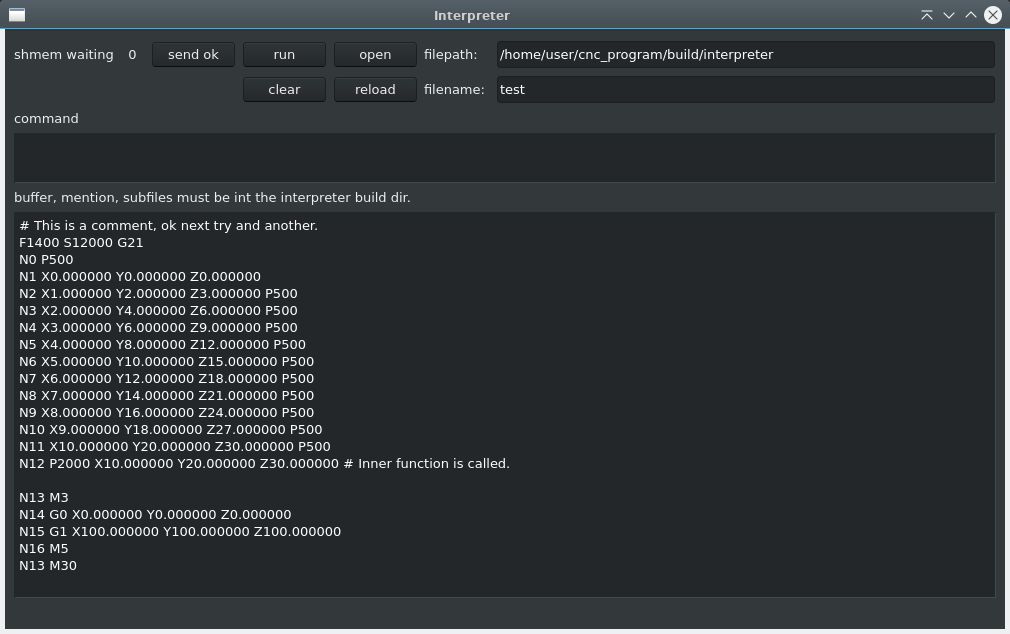Experimental gcode interpreter accepting c++ syntax.
- Grotius
-
 Topic Author
Topic Author
- Offline
- Platinum Member
-

Less
More
- Posts: 2419
- Thank you received: 2345
19 Apr 2024 13:50 #298615
by Grotius
Experimental gcode interpreter accepting c++ syntax. was created by Grotius
Hi,
Disclaimer : * this post is just for info. *
We all know the SAI "stand alone interpreter" from linuxcnc is quite complex.
Therefore i was investing some time in building a interpreter my self. I started using the muParser library
and wrote code to parse gcode. I was focussing on the hard part, like how to deal with nested while loops in the gcode.
I finally get that to work using a node structure. But how about the rest. Like integrating for loops, if, else, and everything else.
After 2 weeks, i decided to try something different. So i made 2 programs. The first program is a gcode parser, the second
program is a interpreter.
In my previous attempt i was trying to reinvent the wheel, but now the gcc compiler does the work for me.
All this code was working within 2 day's.
What is special about this gcode program builder in my opinion :
- It compiles gcode programs into a executable.
- It parses raw gcode into gcode the interpreter can read, like parsing G0 to G(0);
- Within the gcode, c++ code may be used. So when program run's you can just start your ethercat master from inside the gcode.
- Also all hal commands, and all possible c++ code solutions can be used. So in fact you can load and run a entire AI from the gcode.
- Sub programs may be compiled and run within the running gcode. This is a slower process, but is possible.
- Each gcode program that runs send's data to the interpreter trough shared memory.
- Sub programs may be called inside the gcode, they may run in seperate thread by using "&", or in the current program flow,
as a result, this could run multiple machines at the same time, as multiple gcode processes are running.
- Perfect syntax debugging trough the compile process.
- Gcode executables are closed source, so a customer may run the file, but can not directly edit or copy the file so easely.
- Time optimal solution, compiled code is fast.
- Compact and simple source code.
What is the interpreter doing :
- It opens and run's the given gcode executable file.
- It reads the shared memory, the gcode file is sending data struct to, and fills a local string buffer with the gcode commands.
- It displays the gcode commands in the program.
- It waits for ok signal when asked by the gcode program, this is for probing, or for other things that need a ok signal to go on.
Downsides:
- Gcode files are compiled machine code.
Preview gcode program builder :
Preview interpreter:
For now the interpreter runs in the user environment. No hal connection is made so far.
Disclaimer : * this post is just for info. *
We all know the SAI "stand alone interpreter" from linuxcnc is quite complex.
Therefore i was investing some time in building a interpreter my self. I started using the muParser library
and wrote code to parse gcode. I was focussing on the hard part, like how to deal with nested while loops in the gcode.
I finally get that to work using a node structure. But how about the rest. Like integrating for loops, if, else, and everything else.
After 2 weeks, i decided to try something different. So i made 2 programs. The first program is a gcode parser, the second
program is a interpreter.
In my previous attempt i was trying to reinvent the wheel, but now the gcc compiler does the work for me.
All this code was working within 2 day's.
What is special about this gcode program builder in my opinion :
- It compiles gcode programs into a executable.
- It parses raw gcode into gcode the interpreter can read, like parsing G0 to G(0);
- Within the gcode, c++ code may be used. So when program run's you can just start your ethercat master from inside the gcode.
- Also all hal commands, and all possible c++ code solutions can be used. So in fact you can load and run a entire AI from the gcode.
- Sub programs may be compiled and run within the running gcode. This is a slower process, but is possible.
- Each gcode program that runs send's data to the interpreter trough shared memory.
- Sub programs may be called inside the gcode, they may run in seperate thread by using "&", or in the current program flow,
as a result, this could run multiple machines at the same time, as multiple gcode processes are running.
- Perfect syntax debugging trough the compile process.
- Gcode executables are closed source, so a customer may run the file, but can not directly edit or copy the file so easely.
- Time optimal solution, compiled code is fast.
- Compact and simple source code.
What is the interpreter doing :
- It opens and run's the given gcode executable file.
- It reads the shared memory, the gcode file is sending data struct to, and fills a local string buffer with the gcode commands.
- It displays the gcode commands in the program.
- It waits for ok signal when asked by the gcode program, this is for probing, or for other things that need a ok signal to go on.
Downsides:
- Gcode files are compiled machine code.
Preview gcode program builder :
Preview interpreter:
For now the interpreter runs in the user environment. No hal connection is made so far.
Attachments:
The following user(s) said Thank You: tommylight, aleksamc
Please Log in or Create an account to join the conversation.
- programador
-

- Offline
- Senior Member
-

Less
More
- Posts: 70
- Thank you received: 5
15 May 2024 23:58 #300703
by programador
Replied by programador on topic Experimental gcode interpreter accepting c++ syntax.
Very good, congratulations on the initiative.
I am developing a G code generator in Python that transforms DXF files for a punch press. It is not being easy, there is a lack of professionals in the market for such a challenge.
I am developing a G code generator in Python that transforms DXF files for a punch press. It is not being easy, there is a lack of professionals in the market for such a challenge.
The following user(s) said Thank You: Grotius
Please Log in or Create an account to join the conversation.
- blazini36
- Offline
- Platinum Member
-

Less
More
- Posts: 972
- Thank you received: 167
17 May 2024 20:03 #300861
by blazini36
Replied by blazini36 on topic Experimental gcode interpreter accepting c++ syntax.
Sounds cool, could solve some issues trying to work HAL controls into Gcode without using workarounds.
What are the actual plans for it? I assume it will be made available, is it designed to be run as an alternative to the standard interpreter? Integrated into GUIs etc..
What are the actual plans for it? I assume it will be made available, is it designed to be run as an alternative to the standard interpreter? Integrated into GUIs etc..
The following user(s) said Thank You: Grotius
Please Log in or Create an account to join the conversation.
- Grotius
-
 Topic Author
Topic Author
- Offline
- Platinum Member
-

Less
More
- Posts: 2419
- Thank you received: 2345
18 May 2024 06:32 #300890
by Grotius
Replied by Grotius on topic Experimental gcode interpreter accepting c++ syntax.
@Programmador,
Very good, congratulations on the initiative.
I am developing a G code generator in Python that transforms DXF files for a punch press. It is not being easy, there is a lack of professionals in the market for such a challenge.
There is a good read in dxf library for c++, for python there is also a dxf lib. I think ezdxf.
Along the way, you will succeed somehow.
@BlazinI36
Sounds cool, could solve some issues trying to work HAL controls into Gcode without using workarounds.
Yeah, you can use c or c++ directly in the gcode file.
I was thinking to create a virtual ethercat slave, that is not a servo
or a stepper but a gcode interpreter.
What are the actual plans for it? I assume it will be made available, is it designed to be run as an alternative to the standard interpreter? Integrated into GUIs etc..
At the moment i have no time to develop it further as the trajectory planner has to be finished. After that
i maybe will go on this interpreter.
The whole idea for this test is, how should you create a interpreter. I have used a parser like muparser. But this is
a waste of time. The best parser so far i found is the gcc compiler.
I have no plans with it further at the moment. It's like a time stamp in my programming experience, maybe i can use
the knowlegde later on. But it sure has potential to be become fully functional.
Very good, congratulations on the initiative.
I am developing a G code generator in Python that transforms DXF files for a punch press. It is not being easy, there is a lack of professionals in the market for such a challenge.
There is a good read in dxf library for c++, for python there is also a dxf lib. I think ezdxf.
Along the way, you will succeed somehow.
@BlazinI36
Sounds cool, could solve some issues trying to work HAL controls into Gcode without using workarounds.
Yeah, you can use c or c++ directly in the gcode file.
I was thinking to create a virtual ethercat slave, that is not a servo
or a stepper but a gcode interpreter.
What are the actual plans for it? I assume it will be made available, is it designed to be run as an alternative to the standard interpreter? Integrated into GUIs etc..
At the moment i have no time to develop it further as the trajectory planner has to be finished. After that
i maybe will go on this interpreter.
The whole idea for this test is, how should you create a interpreter. I have used a parser like muparser. But this is
a waste of time. The best parser so far i found is the gcc compiler.
I have no plans with it further at the moment. It's like a time stamp in my programming experience, maybe i can use
the knowlegde later on. But it sure has potential to be become fully functional.
The following user(s) said Thank You: tommylight
Please Log in or Create an account to join the conversation.
Time to create page: 0.279 seconds


